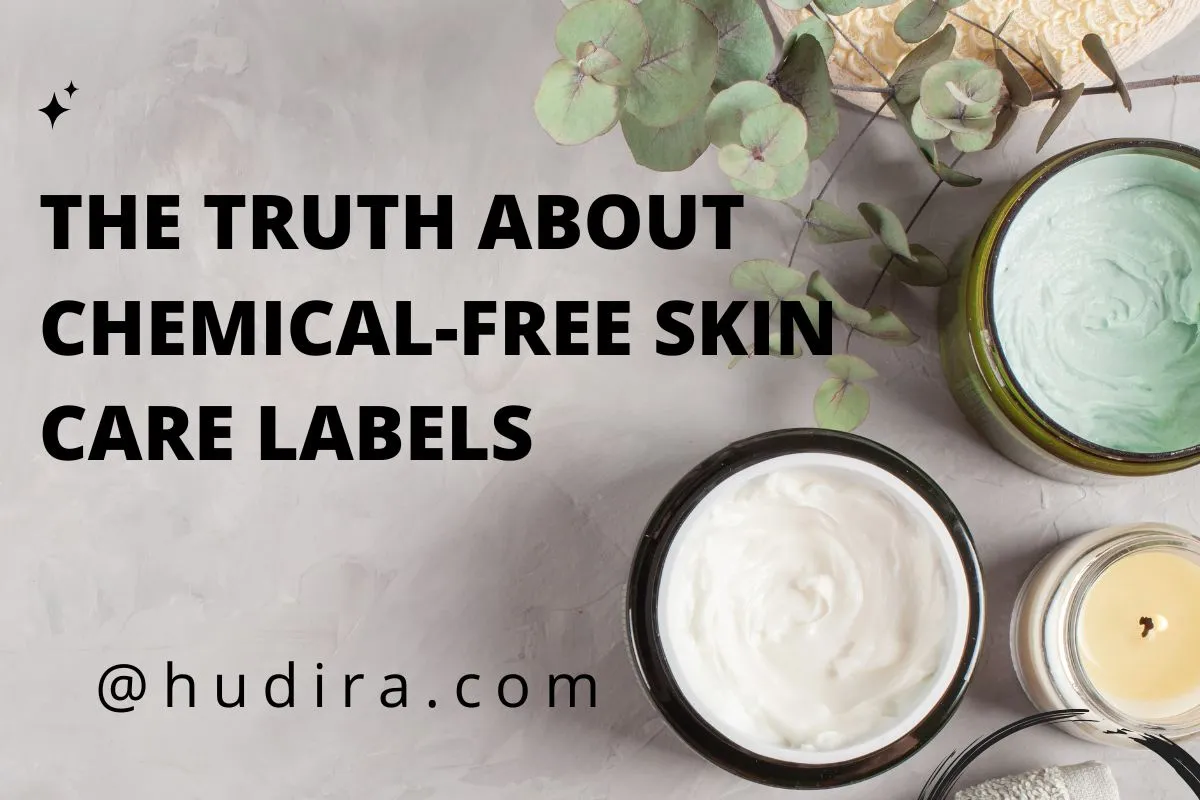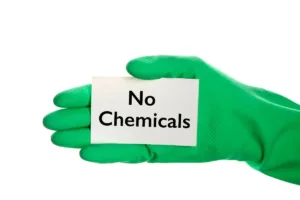No products in the cart.

What Does “Chemical-Free” Really Mean?
In today’s beauty market, “chemical-free skin care” has become more than a buzzword, it’s a movement. With growing awareness around skin sensitivity, ingredient safety, and long-term wellness, many consumers now seek labels promising gentleness and purity. You’ve likely seen “chemical-free products” lined across shelves, paired with lush green packaging and soothing taglines. But how accurate is this label? Can anything truly be free of chemicals?
Here’s where it gets interesting: everything, including water and air, is technically made up of chemicals. So, why do brands use “chemical-free” so freely? And more importantly what should you, as a conscious consumer, really trust? In this blog, we pull back the curtain on misleading skincare labels, reveal industry secrets, and guide you toward brands that prioritize clean beauty, transparency, and ingredient integrity like Hudira.
The Rise of “Chemical-Free Skin Care”
Over the last decade, the demand for chemical-free products has skyrocketed. Skincare brands, influencers, and even dermatologists are talking about going “natural,” “clean,” and “toxin-free.” These terms, while appealing, often lack regulation. The chemical-free skin care trend grew from a valid concern of exposure to irritants, parabens, sulfates, and synthetic fragrances. But in the pursuit of wellness, misinformation has also taken root.
At Hudira, we believe you deserve the full picture, not just marketing fluff. That’s why all our products are created using natural ingredients, with no harmful chemicals added. We formulate every product to honor your skin and protect its long-term health.
The Science Behind “Chemical-Free”
Here’s the truth: nothing is truly chemical-free. Every substance on Earth, natural or synthetic, is made of chemicals. Water is a chemical. Aloe vera, lavender oil, and even air contain chemical compounds.
What people usually mean when they say “chemical-free skincare” is that a product doesn’t contain synthetic, toxic, or harsh chemicals. But this distinction is often lost in advertising. The label “chemical-free” is unregulated, so companies can use it even if their product contains preservatives, alcohols, or synthetic scents.
This is why choosing brands like Hudira matters. We don’t just claim purity, we formulate with transparency, selecting botanical extracts, plant oils, and natural preservatives that are safe, effective, and time-tested.
How “Clean Beauty” Differs
“Clean beauty” is another label you’ve likely seen, one that often overlaps with chemical-free skin care. However, “clean” doesn’t always mean natural. It typically refers to products that avoid ingredients linked to health issues like hormone disruption or skin irritation, even if they’re lab-derived.
Unlike “chemical-free,” the clean beauty movement is supported by ingredient blacklists and voluntary transparency. Clean beauty prioritizes safety over origin, meaning synthetic ingredients can be allowed if they’re proven safe.
At Hudira, we combine the best of both worlds. Our formulations honor clean beauty principles while staying rooted in herbal wisdom and natural labels. Our ingredients are plant-based, dermatologist-trusted, and ideal for sensitive or reactive skin.
Why “Natural Label” Can Also Mislead
Let’s talk about the natural label. Just because an ingredient is “natural” doesn’t mean it’s safe or effective. Poison ivy is natural. So is mercury. The word “natural” is unregulated in cosmetics, making it a marketing term rather than a scientific one.
This is why Hudira focuses on intentional formulation rather than vague claims. Every natural ingredient in our products is there for a reason whether it’s neem for acne, rosewater for hydration, or turmeric for brightening. We test, research, and refine our blends to ensure they deliver results gently.
What to Look for on Chemical-free Skincare Labels

Here’s how to decode skincare labels and make informed choices:
- Look for full ingredient lists (INCI names preferred)
- Avoid vague terms like “fragrance” or “parfum”
- Seek plant-based extracts, cold-pressed oils, and food-grade ingredients
- Research unfamiliar terms many “chemicals” are harmless or even beneficial
- Choose brands (like Hudira) that are open about their formulation philosophy
Our promise: No parabens. No sulfates. No synthetic dyes. No greenwashing.
How Hudira Does It Differently
At Hudira, chemical-free skin care isn’t just a phrase it’s a philosophy. We’ve built our brand around trust, transparency, and the power of nature.
Ingredient Integrity: Every botanical, clay, or oil we use is carefully selected for purity and performance.
Minimalist Formulation: No fillers, just functional ingredients.
Handcrafted in Small Batches: Ensures freshness, potency, and care.
Sustainable & Halal: Our products are ethical, clean, and suitable for all skin types.
With Hudira, you don’t have to read between the lines. Our labels reflect what we truly stand for nature, honesty, and results.
Final Thoughts – Don’t Fall for the Label Trap
It’s easy to be swayed by words like “chemical-free,” “natural,” or “clean.” But your skin deserves more than buzzwords. It deserves truth, nourishment, and care. That’s what Hudira delivers.
Next time you shop, flip the bottle, read the label, and ask yourself: Is this product aligned with what my skin truly needs?
Choose Hudira—where clean beauty meets natural integrity.
Call-to-Action
Ready to experience the power of real, chemical-free skin care?
Explore Hudira’s product range — where every ingredient is natural, honest, and safe for your skin.
FAQs
Q. Is chemical-free skin care really free of all chemicals?
No. Everything contains chemicals, even water. The term means no toxic synthetic chemicals, but it’s not regulated. Always read the full ingredient list.
Q. Are Hudira products completely chemical-free?
Hudira uses no harmful or synthetic chemicals. All ingredients are plant-based, clean, and dermatologist-considered.
Q. What should I avoid on skincare labels?
Look out for parabens, sulfates, synthetic fragrances, PEGs, and “fragrance” without breakdown. These can irritate skin or disrupt hormones.
Q. Why is the “natural” label not always reliable?
“Natural” isn’t a regulated term. It can include unprocessed but unsafe ingredients. Look for tested, skin-safe, plant-derived formulations like Hudira’s.
Q. What is clean makeup?
Clean makeup refers to products formulated without ingredients proven or suspected to harm human health, prioritizing safety and transparency.



Add comment